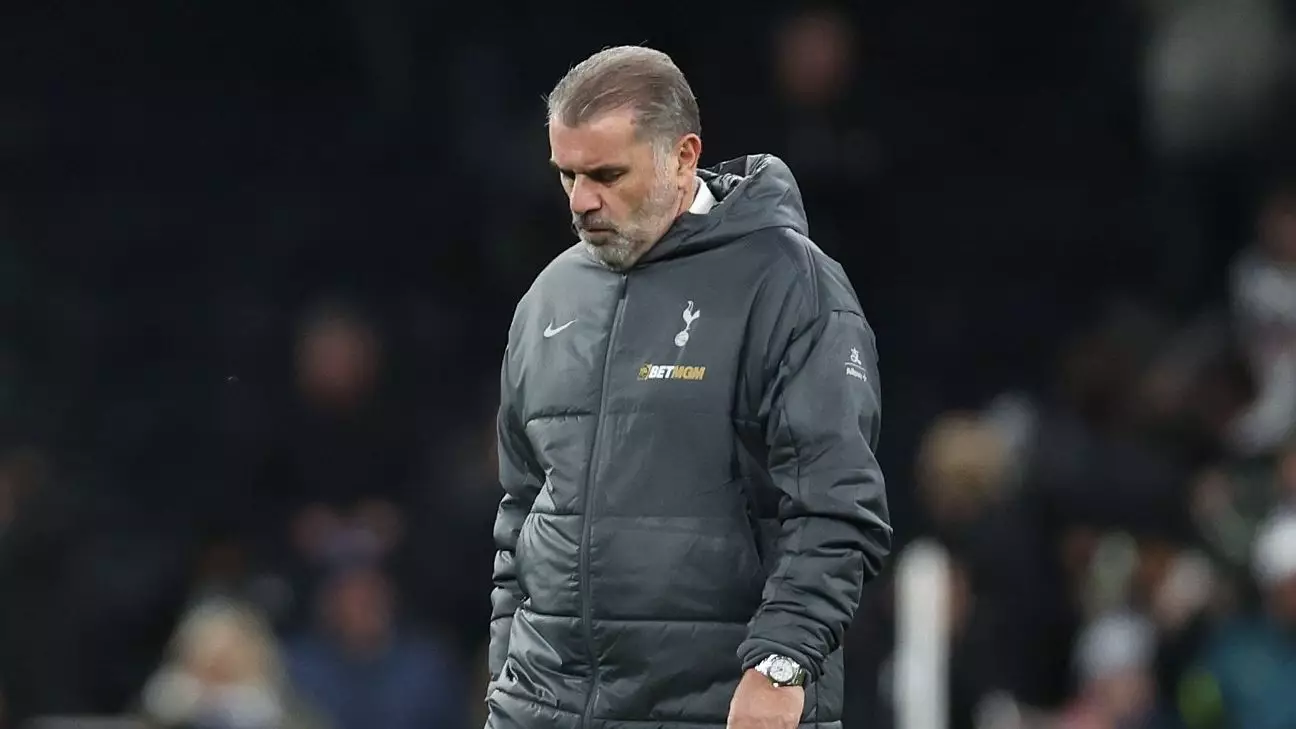Ange Postecoglou, the manager of Tottenham Hotspur, has made headlines this week following a staggering 6-3 loss against Premier League giants Liverpool. While many would expect a coach facing such a severe defeat to reconsider his tactical approach, Postecoglou has instead reaffirmed his dedication to an offensive style of play. This unwavering stance raises questions not only about his strategy but also about the implications it has for his team’s performance and future.
Tottenham’s match against Liverpool showcased a lack of defensive cohesion and an inability to effectively counteract the threat posed by their rivals. Despite a valiant effort that saw James Maddison and Dejan Kulusevski find the net, the defense’s frailties were all too apparent. The initial dominance by Liverpool, marked by early goals from Luis Díaz and Alexis Mac Allister, was a warning sign for the Spurs backline, which has struggled significantly throughout the season.
Postecoglou’s take on the situation was striking. Frustrated by repeated inquiries regarding the team’s defensive shortcomings, he declared, “I’m just going to stop answering these questions.” At first glance, this might appear to signal a retreat into stubbornness. However, it may also reflect a deeper conviction that his attacking philosophy remains the best approach for Spurs, notwithstanding their current predicament in the league standings.
One cannot overlook the context of the current squad’s injuries. Prominent players like goalkeeper Guglielmo Vicario and key defenders Micky van de Ven and Cristian Romero have been sidelined, contributing significantly to the team’s struggles. Postecoglou addressed these injury challenges when pressed about the team’s ongoing issues with clean sheets. Notably, he emphasized the necessity of understanding the external pressures his squad is facing; however, the persistence of those questions reflects fans’ impatience and frustration with the team’s defensive recklessness.
In the manager’s defense, it is pivotal to recognize that injuries often serve as a double-edged sword. While they provide context for a decline in form, they also present an opportunity for depth players to step up and showcase their talent. This is a crucial phase for developing resilience within the squad, vital for long-term success. Nevertheless, the reality of conceding so many goals raises the stakes for both player performance and tactical rigidity.
Concerning his holistic vision for Tottenham, Postecoglou’s commitment to an attacking orientation can be both inspiring and alarming. On one hand, teams that embrace offensive tactics can cultivate an exciting style that attracts both loyal supporters and potential new fans. On the other hand, relentless focus on attack without proper balance can lead to significant defensive lapses, as evident in the recent debacle against Liverpool.
His comments reveal a larger philosophical stance: he believes that sticking to this approach is a pathway to establish a successful, dynamic team. “If you want me to change my approach, it’s not going to change,” Postecoglou asserted. This statement robs fans of the ability to dream of quick fixes or sudden tactical turns. Instead, he urges patience, asserting that building a competitive team is a process that necessitates a steadfast commitment to the attacking game plan he envisions.
A question arises: is Postecoglou’s persistence ultimately misguided? The footballing world is replete with managers who have steered clubs toward greatness through tactical flexibility. Utilizing the strengths of the squad while adapting to weaknesses is a strategy endorsed by many of the game’s best. Therefore, while Postecoglou’s commitment represents a noble ideal centered on identity and ethos, it also risks alienating fans who desire results in the short term.
Ultimately, football is a results-driven game. The pressure to perform can weigh heavily on coaches who adhere to one-dimensional approaches, especially when results are unfavorable. Nevertheless, Postecoglou’s rejection of prevailing criticisms demonstrates an unwavering determination that could serve as the foundation for a reimagined Tottenham. The gamble could herald exciting times if he can effectively cultivate the squad’s potential and establish a protective framework around their defensive deficiencies.
While the future remains uncertain for Tottenham Hotspur, the steadfastness of Postecoglou’s tactical beliefs could either lead to a renaissance at the club or spiraling frustrations for a fanbase yearning for success. Only time will determine the efficacy of his vision as he continues down the path of uncompromising attacking football.

Leave a Reply